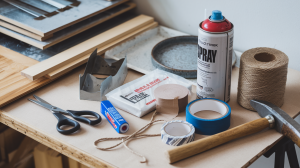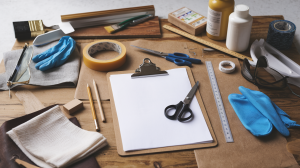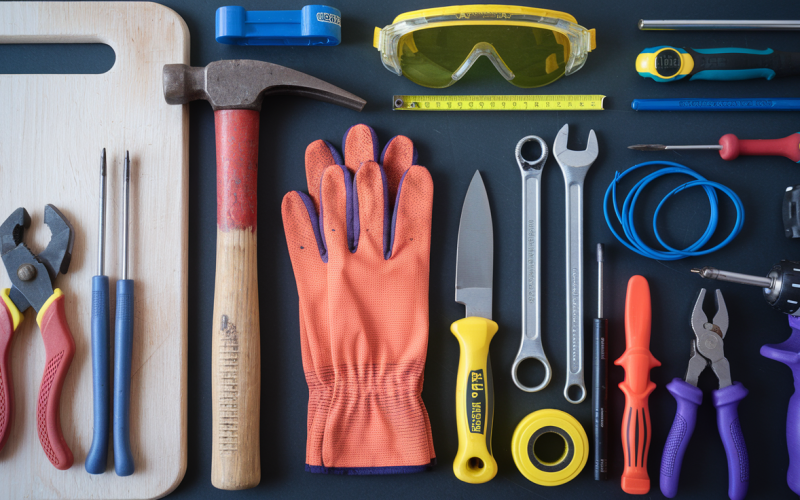Starting your DIY projects is an exciting journey, but it all begins with having the right tools. A well-prepared toolbox sets you up for success.
Items like a sturdy tape measure for accurate measurements, a reliable hammer for various repairs, and a multi-bit screwdriver for different tasks are great starting points. A utility knife is also a must-have for cutting materials.
These tools make it easier to take on home improvement projects confidently. Having these essentials on hand gives you the freedom to tackle a variety of projects, from quick fixes to larger improvements, without unnecessary delays or frustrations.
The right tools turn a daunting task into a rewarding experience, letting you approach each project with ease and enthusiasm.
Why the Right Tools Make a Difference
 Using the right tools saves time and effort, letting you complete projects efficiently. For example, a 16-foot tape measure is perfect for tasks requiring precision, like cutting or installing materials. A rotary tool with multiple attachments adds flexibility for detailed work like sanding or trimming.
Using the right tools saves time and effort, letting you complete projects efficiently. For example, a 16-foot tape measure is perfect for tasks requiring precision, like cutting or installing materials. A rotary tool with multiple attachments adds flexibility for detailed work like sanding or trimming.
Safety equipment, such as an N95 mask, protects you from dust and fumes, while a 24-inch level helps you keep installations straight. A cordless drill with a brushless motor provides the power you need without being tied to an outlet. A heavy-duty staple gun, such as the Arrow T50, is great for securing trim or lightweight materials.
Hand Tools You’ll Use Again and Again
Hand tools are the backbone of any DIY toolkit. They’re easy to use and provide the control needed for many tasks.
- Hammer and Mallet: A hammer is an all-purpose tool for driving nails, assembling furniture, or breaking down materials. Choosing a durable model will serve you well over time. For more delicate work, a rubber mallet comes in handy, helping you fit pieces together without causing damage.
- Screwdrivers: A multi-bit screwdriver is one of the most versatile tools you can own, accommodating a range of screw types and sizes. A basic set with flathead and Phillips tips covers most household needs, from assembling furniture to repairing fixtures.
- Wrenches and Hex Keys: Wrenches and hex keys are indispensable for furniture assembly and tightening bolts. An adjustable wrench and a set of hex keys will handle most situations, while a socket wrench set is useful for more specific needs.
 Tape Measure and Ruler: Accurate measurements are the foundation of any successful project. A 25-foot tape measure works well for larger tasks, while a 12-inch ruler is great for smaller jobs. These tools help avoid common issues like mismatched fittings or uneven cuts.
Tape Measure and Ruler: Accurate measurements are the foundation of any successful project. A 25-foot tape measure works well for larger tasks, while a 12-inch ruler is great for smaller jobs. These tools help avoid common issues like mismatched fittings or uneven cuts.- Utility and Precision Knives: A utility knife handles heavier cutting tasks, such as trimming large materials, while a precision knife is perfect for detailed work. Having both tools in your kit ensures you’re prepared for a wide range of tasks, from packaging to intricate designs.
Power Tools to Expand Your Capabilities
Power tools take DIY to the next level, making tasks faster and more efficient.
- Power Drill: A cordless drill is a versatile tool for drilling holes and driving screws. Brands like DeWalt and Makita offer reliable options for beginners. A good drill simplifies many projects, such as assembling furniture or hanging shelves, allowing for precise and quick work.
- Drill Bits: A quality set of drill bits increases your drill’s usefulness. Look for kits with bits designed for wood, metal, and masonry. A good selection ensures you’re ready for various tasks without needing multiple tools.
- Multi-Tool: A multi-tool is like having a compact toolbox in your hand. It can cut, sand, and scrape, making it useful for projects that require precision. A circular saw is another useful addition for clean, straight cuts in wood, while a router is perfect for shaping and trimming.
Building a Reliable Toolkit
Creating a toolkit that suits your needs starts with understanding the projects you’ll work on most.
Here’s how to build a collection that works for you:
- Start with the Basics: Begin with must-haves like adjustable wrenches, a screwdriver set, and a durable tape measure. Safety gear, such as goggles and gloves, is equally important. Adding a hammer and a utility knife gives you a solid foundation for many tasks.
 Add Power Tools Gradually: Once you have the basics, invest in power tools that fit your projects. A cordless drill and a rotary tool are excellent first additions, providing versatility for many applications. If woodworking is your focus, a miter saw can help you make precise cuts.
Add Power Tools Gradually: Once you have the basics, invest in power tools that fit your projects. A cordless drill and a rotary tool are excellent first additions, providing versatility for many applications. If woodworking is your focus, a miter saw can help you make precise cuts.- Stay Organized: Organization is key to getting the most out of your tools. A sturdy tool bag or box keeps your collection accessible and in good condition. Sorting tools by type or frequency of use makes it easier to find what you need.
A Well-Stocked Toolbox: Your DIY Advantage
With the right tools, DIY projects become easier and more rewarding. Whether you’re repairing a hinge or designing custom shelving, having the proper supplies helps you work efficiently and achieve great results.
For more tips and inspiration, visit Green Nest News. Discover practical advice and expert insights to help you tackle your next DIY project with confidence.

